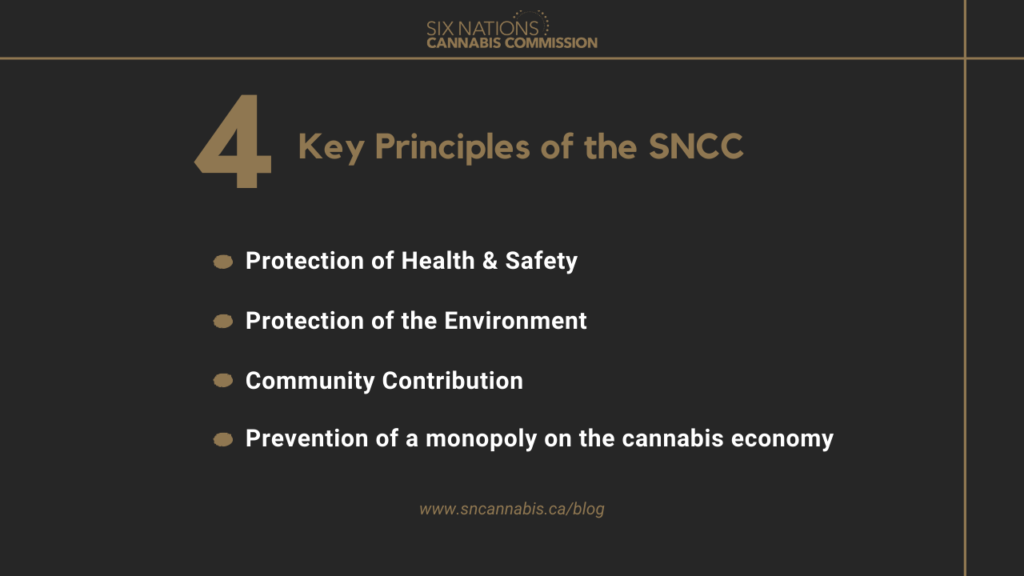
Founded in 2019, the Six Nations Cannabis Commission (SNCC) was established to develop a legal cannabis regulator that supports community-owned and operated cannabis businesses within the Six Nations community. The SNCC strives to provide the Six Nations community with access to safe, regulated cannabis, that is both for and from the community.
Since its creation, the SNCC has worked and continues to work with industry experts and community members to develop a framework that will allow for the production and distribution of safe cannabis products across the Six Nations community. Health and safety, protecting our environment and self-determination serve as the North Star for the Commission as we make decisions.
With the commission’s mission including “For our community, From our community”, the SNCC was established to develop a legal cannabis regulator regime to support community-owned and operated cannabis businesses within the Six Nations community. As the commission is still new and constantly looking for ways to build and grow, access to community involvement plays a large part in the evolution of the SNCC and its community-driven efforts.
To ensure that its community-driven mission is met, the Commission identified four (4) key guiding principles for executing its mandates. The SNCC proudly stands on these 4 key principles and applies them to their work every day.
The 4 principles are:
1. Community Contribution
It is important to the SNCC that the members of the Six Nations community reap the benefits of the regulated cannabis industry that’s being built, in more ways than just having access to safe cannabis. The economic prosperity that the growth of the cannabis industry will produce has the potential to stimulate the Six Nations economy, while also providing an opportunity for the commission to give back to the community which is hoped to play a part in establishing the SNCC as a valuable addition to the community while also reducing the stigma of crime and violence surrounding cannabis.
The commission will take profits made from sales, in excess of its operational expenses and other liabilities, and put a percentage of it back into the community. Through consultation with the Council and the Six Nations community, how these profits will be contributed to the community will be determined. As the commission and its work expand, these contributions will grow along with it, making the SNCC a well-known source of funding for different community initiatives.
Community contribution is a principle that plays a large part in the work that the commission carries out, as the commissioners thoroughly believe the cannabis industry can be used as a tool that can attribute to the wellbeing of all community members, whether or not they are cannabis consumers.
2. Protection of Health and Safety
The commission’s goal of regulating cannabis products throughout the community means eventually putting an end to the possibility of any health and safety concerns, which is an issue as a result of the black market. The commission’s regulations and laws set clear guidelines that set the standard for health and safety concerns in cannabis products, to protect the community from consuming products that aren’t in their best interest. There are strict and detailed procedures and regulations that have been outlined by the commission, which must be met by SNCC-approved retailers and producers to safeguard cannabis. SNCC-regulated retail locations protect the community’s health and safety as all products held in such locations are SNCC-regulated products, which have been vetted to meet a high level of health and safety standards. Members of the Six Nations community can feel confident when purchasing SNCC-regulated products that there won’t be any ingredients that aren’t labeled, there won’t be traces of any other substances, and that products have been vigorously tested and checked.
The SNCC is working to create safe and accessible cannabis that is a better choice of consumption for the Six Nations community with their health and safety procedures and guidelines, which confirm the legitimacy and security of the products being sold to the members of the community. The black market of cannabis for too long has been at the center of a health and safety crisis, where there is little to no information and regulation on how safe it truly is. This lack of transparency and awareness of health and safety measures leaves members of the community who consume such products to be at risk of a handful of potential risks.
Unregulated cannabis products are riddled with unknown factors such as…
- Who is producing it
- How is it being produced
- The standard it is held to
- The health and safety procedures followed in production
- Where it’s being produced
- What is in the products
The commission’s role is to ensure those in the cannabis business meet health and safety standards, but at the same time not to micromanage the day-to-day business decisions of entrepreneurs through unnecessary red tape. With the work of the SNCC, there will no longer be a fear surrounding the safety of cannabis products, opening up the opportunity for more community members to feel safe and confident in using recreational cannabis.
3. Protection of the Environment
The special relationship that the Six Nations community shares with Earth and the gifts of water, air, and fire that she provides must be honoured throughout the duration of any and all work that the SNCC takes part in. The connection between indigenous peoples and earth is deep-rooted and spiritual, as it is essential for survival on earth and must be respected with such importance. It is a crucial concern of the Commission to ensure that the environment is protected throughout the work it is tied to, as the values they hold outside of work must be brought to the forefront of the SNCC.
By putting regulations and laws in place for the growing and producing of cannabis products, the environment is established as a necessity to respect and honour. The commission’s protection of the environment gives community members peace of mind in knowing that all SNCC-approved products were grown and/or made without damaging the environment. The Six Nations community can support the commission with ease, knowing that what was taken from the environment throughout the process of their work was done with great care and awareness.
To protect the land in a precautionary manner, the commission thoroughly surveys the land before approving any facilities to be built on it. To ensure the land is appropriate to be built upon, the commission considers any historic activity and cultural significance, adjacent areas, environmental and natural heritage considerations, availability, and types of services required for the site including water use and waste material disposal. There are also regulations in place that ensure cannabis retail and production facilities are appropriately separated from schools, daycares, longhouses, and places of worship.
Protecting the environment is a priority for all SNCC licensed growers, producers, and retailers and their practices within their work. Being licensed by the SNCC means that these individuals have made a promise to not harm the environment throughout their day-to-day work, and will ensure that respect for the land remains a priority at all times. The commission can promise the community that its strict regulations and laws surrounding environmental protection will be closely monitored, and taken very seriously. These environmental regulations and laws were put in place for the benefit of the community and the respect of the earth, which must be sustained at all times in order for licensed retailers and workers to keep their licenses.
4. Prevention of monopoly.
With the community-centric approach the commission takes throughout every aspect of their work, it is important that the profits gained from the business are not monopolized. Rather, the SNCC finds it important to create a new and growing economy that can fairly be spread across the community members that are taking part in licensed cannabis production and distribution. This principle adopted by the SNCC will provide a legal and profitable way for community members to reap the benefits of being in the cannabis industry, providing them with the opportunity to be a part of a growing economy that is stimulated by cannabis.
The business of cannabis has been vastly profitable across Canada since its legalization in 2018, with all aspects of the business creating numerous kinds of jobs to stimulate the economy which includes but is not limited to…
- Growers
- Production facility workers/managers
- Budtenders
- Retail store owners
- Distributors
- Health and Safety Managers
These listed positions are just a few of the many that have become available across Canada since the legalization of cannabis, allowing for the cannabis industry to grow as an up-and-coming sector of the country’s economy. While the process of job creation in the Six Nations cannabis industry is just starting, the SNCC hopes to see the creation of similar jobs across the community in the future. As these positions would provide the members with new opportunities to partake in meaningful work. The creation of these jobs means the stimulation of the Six Nations economy in a new and growing industry where the possibilities of profit for workers are vast.
The commission’s focus on monopoly prevention is not seen in the black market of cannabis. In contrast, those who partake in it are often looking to maintain customers and profits themselves rather than spreading the opportunity of wealth across the community. Being the governing body in legal cannabis means that the black market will not have the opportunity to gatekeep profits or engage in non-friendly competition with other retailers or producers. The profits that come as a result of cannabis production and sales should be fairly spread across the community and those who partake in the essential steps of getting safe legal cannabis into the hands of community members. The regulations and laws initiated by the commission will always support a local industry that is an oligopoly that benefits the community, rather than a monopoly that hoards funds and opportunities for themselves.
The SNCC is excited to work with our community members to shape the future of the cannabis industry here at Six Nations by applying these 4 principles throughout all of the work they participate in. It is these key principles that will provide an opportunity for the community to reap the benefits of the cannabis industry, from consuming safe products to stimulating the local economy. The commission proudly values themselves on the use of these principles and will stay true to them as the cannabis industry across the Six Nations community continues to flourish.
To learn more about the laws and regulations that were built off of these 4 key principles, please visit either of our following pages…

